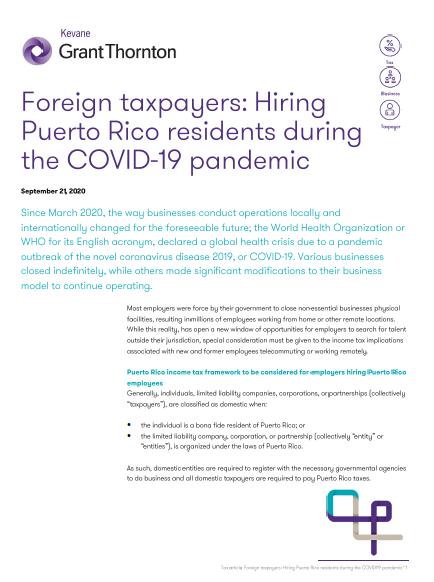Since March 2020, the way businesses conduct operations locally and internationally changed for the foreseeable future; the World Health Organization or WHO for its English acronym, declared a global health crisis due to a pandemic outbreak of the novel coronavirus disease 2019, or COVID-19. Various businesses closed indefinitely, while others made significant modifications to their business model to continue operating.
Most employers were force by their government to close non-essential businesses physical facilities, resulting in millions of employees working from home or other remote locations. While this reality, has open a new window of opportunities for employers to search for talent outside their jurisdiction, special consideration must be given to the income tax implications associated with new and former employees telecommuting or working remotely.
Puerto Rico income tax framework to be considered for employers hiring Puerto Rico employees
Generally, individuals, limited liability companies, corporations, or partnerships (collectively “taxpayers”), are classified as domestic when:
- the individual is a bona fide resident of Puerto Rico; or
- the limited liability company, corporation, or partnership (collectively “entity” or “entities”), is organized under the laws of Puerto Rico.
As such, domestic entities are required to register with the necessary governmental agencies to do business and all domestic taxpayers are required to pay Puerto Rico taxes.
In the case of a foreign or nonresident taxpayers, the classification of “foreign” is determine when:
- the individual is a bona fide resident of a jurisdiction other than Puerto Rico; or
- the entity was organized under the laws of another jurisdiction.
Foreign taxpayers are required to register and pay taxes when doing business in Puerto Rico and deriving income from operations in the island.
But what happens when a taxpayer that has never done business in Puerto Rico (“Foreign Taxpayer”), employs residents of the island to “work remotely”? According to the Puerto Rico Internal Revenue Code of 2011 (“PR Code”), there are two ways for a Foreign Taxpayer to be considered engaged in a trade or business in Puerto Rico:
- they must have gross income from sources within Puerto Rico; or
- they must have gross income treated as being effectively connected with the conduct of an active trade or business in Puerto Rico.
Income from sources within Puerto Rico
The Puerto Rico Code states that compensation for labor or personal services performed in Puerto Rico, is considered from sources within Puerto Rico, and therefore, subject to Puerto Rico tax, unless two conditions are met:
- the services are performed by a nonresident individual temporarily present in Puerto Rico (90 days or less during the year); and
- the compensation does not exceed $3,000 in the aggregate, during the year.
If both conditions are met, known as “de minimis rule”, the compensation received by the employee for services performed in Puerto Rico for the Foreign Taxpayer, is not deemed income from sources within Puerto Rico.
As already established, income from sources within Puerto Rico includes compensation for labor or personal services performed within Puerto Rico. Furthermore, the compensation is from sources within Puerto Rico no matter:
- the residence of the payer;
- the place in which the contract for service was made; or
- the place of payment.
For purposes of applying this rule, the Foreign Taxpayer is not necessarily engaged in an active trade or business in Puerto Rico by reason of the performance of personal services by an employee in the island.
Meanwhile, if a specific amount is paid, said amount (if deemed from sources within Puerto Rico and does not comply with “de minimis rule”), is included as Puerto Rico income.
In many cases, the facts and circumstances allow for an allocation on the time basis; that is, including as income an amount which allows the same relation to the total compensation as the number of days of performance of labor or services within Puerto Rico, as to the total number of days of performance of labor or services for which the payment is made.
In other cases, the facts and circumstances require the use of other reasonable methods of allocation and distribution.
Effectively connected income
The Puerto Rico Code and its regulations set forth the rules for a Foreign Taxpayer to determine if income is considered effectively connected with Puerto Rico.
For example, if all income, gain, or loss derived during the year by a Taxpayer engaged in trade or business in Puerto Rico, is from sources within Puerto Rico, and said income consists of fixed or determinable income, gain, or loss, then is treated as income effectively connected with the active conduct of a trade or business in Puerto Rico, whether or not derived from the active conduct of such trade or business.
In the case of income from sources without Puerto Rico, to be treated as effectively connected to Puerto Rico, the Foreign Taxpayer must have an office or fixed place of business (“office”) in Puerto Rico to which the income may be attributable.
To determine if a Foreign Taxpayer has an office in Puerto Rico, a case by case analysis is required, reviewing the facts and circumstances, including, the nature of the trade or business, and the office actually required in the ordinary course of business.
Generally, an office is a fixed facility through which the Foreign Taxpayer engages in a trade or business, and it does not need to be continuously used. Nevertheless, a Foreign Taxpayer does not have an office in Puerto Rico merely because they use another person's office to transact a business if the business activity of the Foreign Taxpayer in that office is relatively sporadic or infrequent.
However, where the employee, in the ordinary course of its duties, carries on the activities of the employer in or through an office of such employer which is regularly used by the employee in the course of carrying out its functions, such office is considered the office of the employer.
Therefore, for Puerto Rico income tax purposes, the determination of whether or not a Foreign Taxpayer is considered engaged in trade or business or deriving effectively connected income from Puerto Rico, due to the remote services provided by an employee, will depend on the facts and circumstance of each case.
Nonetheless, if such employee is a bona fide resident of Puerto Rico or is a nonresident that received compensation of more than certain thresholds amount, the Foreign Taxpayer will be required to register for payroll tax purposes.
Further evaluation should be made to determine if the Foreign Taxpayer is engaged in trade or business in Puerto Rico for sales and use tax purposes, considering that the nexus and source of income rules are different.
Implications for the employee
Notwithstanding engage in trade or business rules for the Foreign Taxpayer, one fact remains certain: the employee is required to pay Puerto Rico taxes.
Pursuant to the Puerto Rico Code, an individual resident of Puerto Rico or nonresident employees that has gross income for a particular taxable year from Puerto Rico source, is required to file a Puerto Rico income tax return when the gross income, reduced by any applicable exemptions, is greater than zero, unless the total tax on the gross income has been withheld at source. Moreover, the employee that is resident of Puerto Rico, may be required to file a Federal income tax return.
However, pursuant to the United States Internal Revenue Code (“US Code”), the are certain items that are not included in gross income and are excluded from taxation. For example, in the case of an individual who is a bona fide resident of Puerto Rico during the entire taxable year, income derived from sources within Puerto Rico (except amounts received for services performed as an employee of the U.S. government or any agency thereof), is not subject to federal taxation.
Therefore, the employee, as a bona fide resident of Puerto Rico, will be subject to Puerto Rico income tax on its worldwide income, including either services rendered from Puerto Rico, the U.S., or any other foreign jurisdiction. In case the employee is subject to U.S. federal or foreign jurisdiction income taxes, a foreign tax credit could be claimed in the employee’s Puerto Rico Individual Income Tax Return. Furthermore, as a bona fide resident of Puerto Rico, the employee will not be subject to federal income taxes on compensation for labor or services performed in Puerto Rico, and as such, no federal income tax withholdings should be made.


